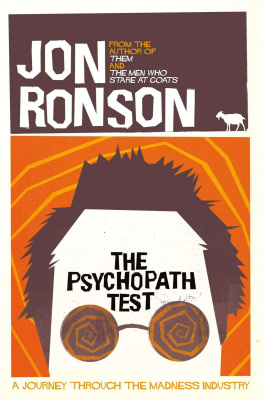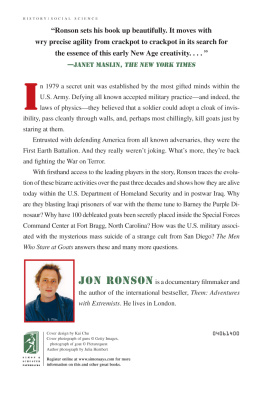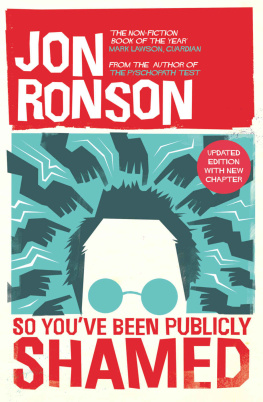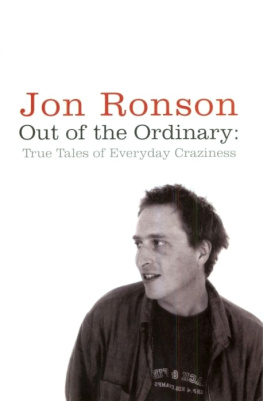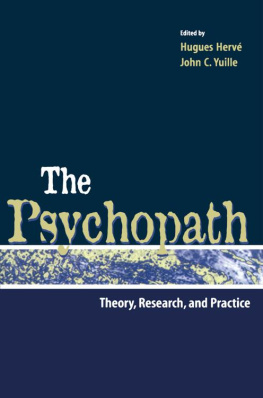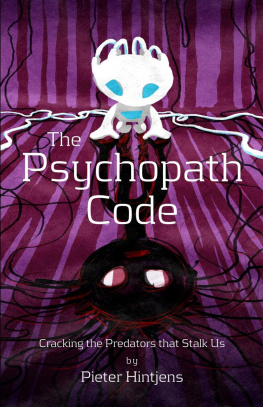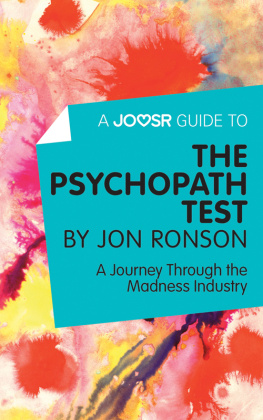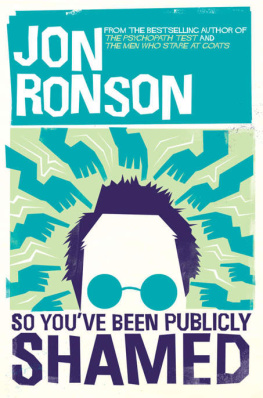Ronson - The Psychopath Test
Here you can read online Ronson - The Psychopath Test full text of the book (entire story) in english for free. Download pdf and epub, get meaning, cover and reviews about this ebook. City: London, year: 2011, publisher: Pan Macmillan;Picador, genre: Detective and thriller. Description of the work, (preface) as well as reviews are available. Best literature library LitArk.com created for fans of good reading and offers a wide selection of genres:
Romance novel
Science fiction
Adventure
Detective
Science
History
Home and family
Prose
Art
Politics
Computer
Non-fiction
Religion
Business
Children
Humor
Choose a favorite category and find really read worthwhile books. Enjoy immersion in the world of imagination, feel the emotions of the characters or learn something new for yourself, make an fascinating discovery.
- Book:The Psychopath Test
- Author:
- Publisher:Pan Macmillan;Picador
- Genre:
- Year:2011
- City:London
- Rating:5 / 5
- Favourites:Add to favourites
- Your mark:
- 100
- 1
- 2
- 3
- 4
- 5
The Psychopath Test: summary, description and annotation
We offer to read an annotation, description, summary or preface (depends on what the author of the book "The Psychopath Test" wrote himself). If you haven't found the necessary information about the book — write in the comments, we will try to find it.
Ronson: author's other books
Who wrote The Psychopath Test? Find out the surname, the name of the author of the book and a list of all author's works by series.
The Psychopath Test — read online for free the complete book (whole text) full work
Below is the text of the book, divided by pages. System saving the place of the last page read, allows you to conveniently read the book "The Psychopath Test" online for free, without having to search again every time where you left off. Put a bookmark, and you can go to the page where you finished reading at any time.
Font size:
Interval:
Bookmark:
THE PSYCHOPATH TEST
A Journey Through the Madness Industry
PICADOR
For Anita Bhoomkar (19662009)
A lover of life and all its madness.
CONTENTS
THE MISSING PART OF THE PUZZLE REVEALED
This is a story about madness. It begins with a curious encounter at a Costa Coffee shop in Bloomsbury, Central London. It was the Costa where the neurologists tended to go, the University College London School of Neurology being just around the corner. And here was one now, turning onto Southampton Row, waving a little self-consciously at me. Her name was Deborah Talmi. She looked like someone who spent her days in laboratories and wasnt used to peculiar rendezvous with journalists in cafes and finding herself at the heart of baffling mysteries. She had brought someone with her. He was a tall, unshaven, academic-looking young man. They sat down.
Im Deborah, she said.
Im Jon, I said.
Im James, he said.
So, I asked. Did you bring it?
Deborah nodded. She silently slid a package across the table. I opened it and turned it over in my hands.
Its quite beautiful, I said.
Last July, Deborah received a strange package in the mail. It was waiting for her in her pigeonhole. It was postmarked Gothenburg, Sweden. Someone had written on the padded envelope Will tell you more when I return! But whoever had sent it didnt leave their name.
The package contained a book. It was only forty-two pages long, twenty-one of which every other page were completely blank, but everything about it, the paper, the illustrations, the typeface, looked very expensively produced. The cover was a delicate, eerie picture of two disembodied hands drawing each other. Deborah recognized it as a reproduction of M. C. Eschers Drawing Hands.
The author was a Joe K (a reference to Kafkas Joseph K, maybe, or an anagram of joke?) and the title was Being or Nothingness, which was some kind of allusion to Sartres 1943 essay, Being and Nothingness. Someone had carefully cut out with scissors the page that would have listed the publishing and copyright details, the ISBN number, etc., so there were no clues there. A sticker read, Warning! Please study the letter to Professor Hofstadter before you read the book. Good Luck!
Deborah leafed through it. It was obviously some kind of a puzzle waiting to be solved, with cryptic verse and pages where words had been cut out, and so on. She looked again at the Will tell you more when I return! One of her colleagues was visiting Sweden, and so even though he wasnt normally the sort of person to send out mysterious packages, the most logical explanation was that it had come from him.
But then he returned, and she asked him, and he said he didnt know anything about it.
Deborah was intrigued. She went on the Internet. And it was then she discovered she wasnt alone.
Were the recipients all neurologists? I asked her.
No, she said. Many were neurologists. But one was an astrophysicist from Tibet. Another was a religious scholar from Iran.
They were all academics, said James.
They had all received the package the exact same way Deborah had in a padded envelope from Gothenburg upon which was written Will tell you more when I return! They had gathered on blogs and message-boards and were trying to crack the code.
Maybe, suggested one recipient, the book should be read as a Christian allegory, even from the enigmatic Will tell you more when I return! (Clearly a reference to the Second Coming of Jesus.) The author/authors seem to be contradicting Sartres atheist Being AND Nothingness (not B OR N).
A researcher in perceptual psychology called Sarah Allred agreed: I have a vague suspicion this is going to end up being some viral marketing / advertising ploy by some sort of religious organization in which academics / intellectuals / scientists / philosophers will come off looking foolish.
To others this seemed unlikely: The expensiveness factor rules out the viral theory unless the campaign is counting on their carefully-selected targets to ponder about the mysterious book online.
Most of the recipients believed the answer lay, intriguingly, with them. They had been hand-picked to receive the package. There was clearly a pattern at work, but what was it? Had they all attended the same conference together years ago or something? Maybe they were being headhunted for a top position in some secretive business?
First one to crack the code gets the job so to speak? wrote one Australian recipient.
What seemed obvious was that a brilliant person or organization with ties to Gothenburg had devised a puzzle so complex that even clever academics like them couldnt decipher it. Perhaps it couldnt be decoded because the code was incomplete. Maybe there was a missing piece. Someone suggested holding the letter closely over a lamp or try the iodine vapor test on it. There may be some secret writing on it in another type of ink.
But there didnt turn out to be any secret writing.
They threw up their hands in defeat. If this was a puzzle that academics couldnt solve, maybe they should bring in someone more brutish, like a private investigator or a journalist. Deborah asked around. Which reporter might be tenacious and intrigued enough to engage with the mystery?
They went through a few names.
And then Deborahs friend James said, What about Jon Ronson?
On the day I received Deborahs email inviting me to the Costa Coffee I was in the midst of quite a bad anxiety attack. I had been interviewing a man named Dave McKay. He was the charismatic leader of a small Australian religious group called the Jesus Christians and had recently suggested to his members that they each donate their spare kidney to a stranger. Dave and I had got on pretty well at first hed seemed engagingly eccentric and I was consequently gathering good material for my story, enjoyably nutty quotes from him, etc. but when I proposed that group pressure, emanating from Dave, was perhaps the reason why some of his more vulnerable members might be choosing to give up a kidney, he exploded. He sent me a message saying that to teach me a lesson he was putting the brakes on an imminent kidney donation. He would let the recipient die and her death would be on my conscience.
I was horrified for the recipient and also quite pleased that Dave had sent me such a mad message that would be good for my story. I told a journalist that he seemed quite psychopathic (I didnt know a thing about psychopaths but I assumed that that was the sort of thing they might do). The journalist printed the quote. A few days later Dave emailed me: I consider it defamatory to state that I am a psychopath. I have sought legal advice. I have been told that I have a strong case against you. Your malice toward me does not allow you to defame me.
This was what I was massively panicking about on the day Deborahs email to me arrived in my inbox.
What was I thinking? I said to my wife, Elaine. I was just enjoying being interviewed. I was just enjoying talking. And now its all fucked. Dave McKay is going to sue me.
Whats happening? yelled my son, Joel, entering the room. Why is everyone shouting?
I made a silly mistake, I called a man a psychopath, and now hes angry, I explained.
Whats he going to do to us? said Joel.
There was a short silence.
Nothing, I said.
But if hes not going to do anything to us why are you worried? said Joel.
Im just worried that Ive made him angry, I said. I dont like to make people upset or angry. Thats why Im sad.
Youre lying, said Joel, narrowing his eyes. I know you dont mind making people angry or upset. What is it that you arent telling me?
Ive told you everything, I said.
Next pageFont size:
Interval:
Bookmark:
Similar books «The Psychopath Test»
Look at similar books to The Psychopath Test. We have selected literature similar in name and meaning in the hope of providing readers with more options to find new, interesting, not yet read works.
Discussion, reviews of the book The Psychopath Test and just readers' own opinions. Leave your comments, write what you think about the work, its meaning or the main characters. Specify what exactly you liked and what you didn't like, and why you think so.

